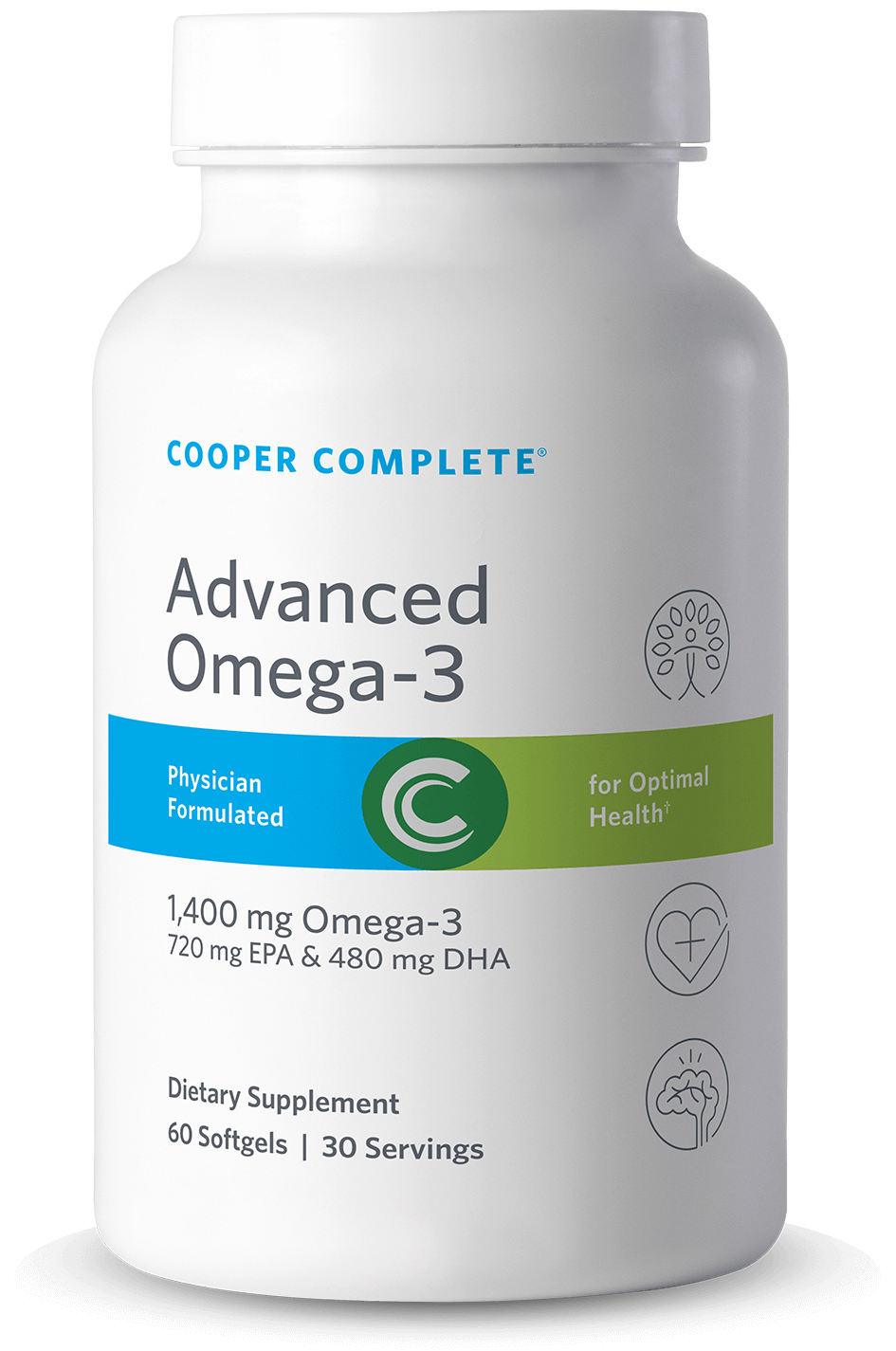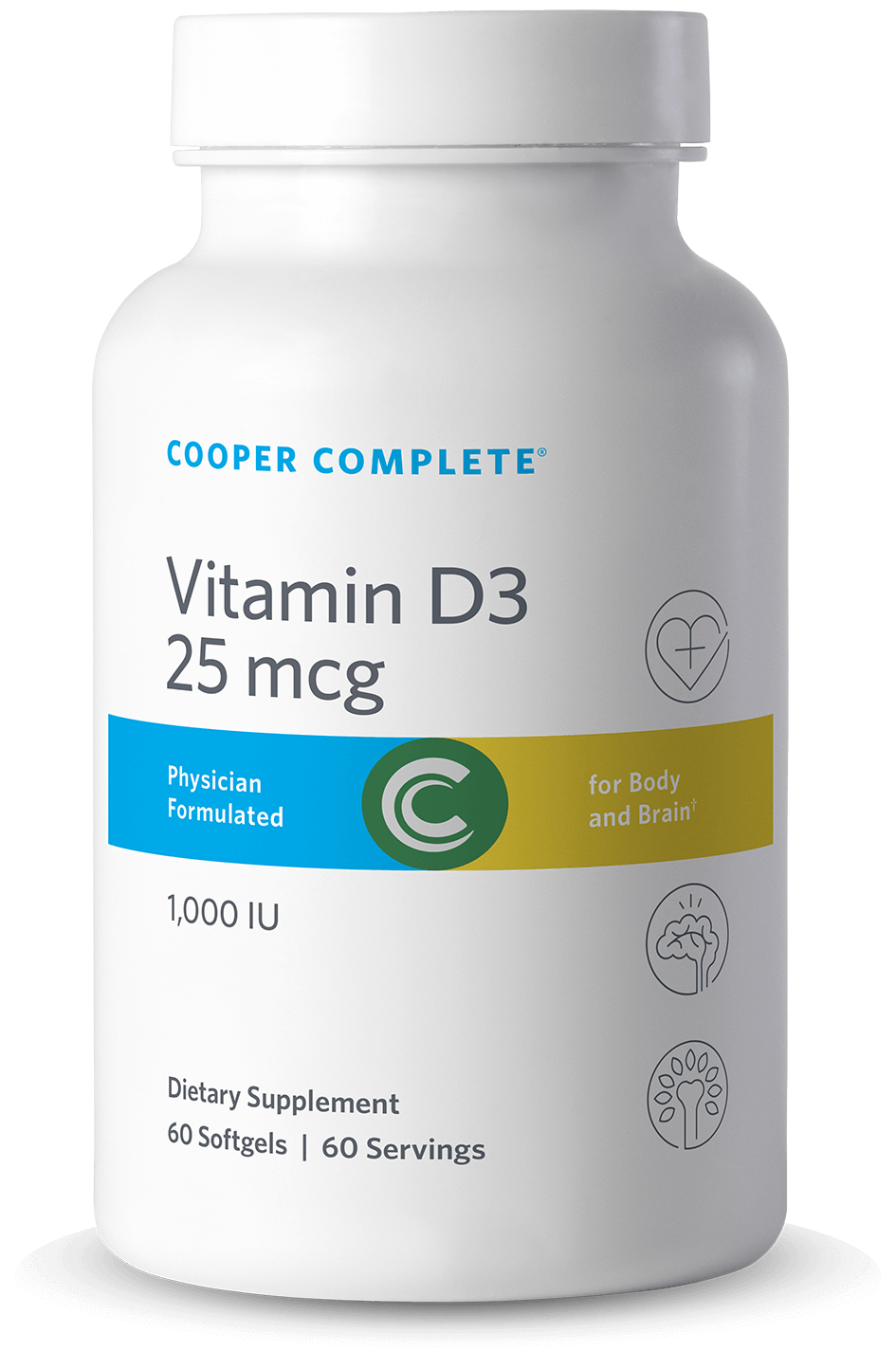Doctor’s Orders: Daily Supplements

At Cooper Clinic, physicians view measuring your body chemistry as an essential component to knowing how to improve the quality and quantity of your life. Camron Nelson, MD, Cooper Clinic President and CEO and Preventive Medicine Physician, explains the three key vitamin levels that are specifically measured and closely analyzed during a Cooper Clinic comprehensive preventive exam and what he, in turn, recommends to all his patients: omega-3, vitamin D and B12.
Omega-3

Advanced Omega-3 Supplement
Advanced Omega 3 Supplement contains 720 mg EPA, 480 mg DHA, and 200 mg other omega-3 fatty acids in each serving of two lemon-flavored softgels. Omega 3 supplementation supports heart health, cognition, immune, and inflammatory health without any fishy aftertaste.†
$22.98 Add to cartAccording to Dr. Nelson, at the end of the day it’s really quite simple: either eat more fish or take a supplement. The body can’t produce omega-3 fatty acids from scratch so it must get it from foods such as fish, vegetable oils, nuts, flax seeds and leafy vegetables. With most Americans not meeting the two servings of fish per week requirement, there are many proven benefits to taking an omega-3 supplement. In a Harvard study, patients who had a higher risk of heart disease or previously had a heart attack or had higher calcium scores in their arteries lowered their risk of heart attack by 20 percent and their risk of developing severe cardiovascular disease by 40 percent by taking omega-3 daily. The same study also showed a 77 percent risk decrease of heart attack in African Americans, with continuing research being performed to explain why this group benefited even more. Omega-3 fatty acids have also been proven to help lower triglyceride levels.
What might make omega-3 supplements so mighty? “It probably has something to do with the anti-inflammatory effect of omega-3 in the arteries,” Dr. Nelson explains. However, he strongly believes you can’t supplement a bad lifestyle. “I encourage my patients to first work on foundational lifestyle choices to decrease inflammation and risk for heart disease through diet, exercise and weight management along with blood pressure and cholesterol control before we add supplements to the mix,” says Dr. Nelson. Then, Dr. Nelson recommends taking two Cooper Complete Advanced Omega-3 softgels a day to optimize heart health, which provides 1,400 mg of omega-3 including 720 mg of EPA and 480 mg DHA.
Vitamin D
Often referred to as the sunshine vitamin, our bodies are unable to absorb an adequate amount of vitamin D from sun exposure without putting our dermatologic health at risk. Vitamin D deficiency is now becoming a global concern as people at higher latitudes, or those who live north of the line connecting San Francisco to Philadelphia (and Athens to Beijing), typically receive less sunshine for the majority of the year. In addition, individuals with darker skin complexions are not able to absorb vitamin D as efficiently.

Vitamin D3 25 mcg (1000 IU) Supplement
Many individuals don't get enough vitamin D from sunlight or through diet. Vitamin D3 form of Vitamin D Supplement for better absorption.
$12.98 Add to cartVitamin D is vital to having a healthy immune system, aiding in fighting off infections and viruses more effectively. A Health Professional Follow-Up Study found in 50,000 men, whose vitamin D levels were monitored over the course of 10 years, those who were deficient in vitamin D were twice as likely to have a heart attack. Other studies show an associated risk of heart failure, stroke and overall cardiovascular disease.
Evidence supports that robust levels of vitamin D lowers one’s risk of developing certain cancers, specifically colorectal cancer. Vitamin D is also important to maintaining bone density—helping decrease women’s risk of osteoporosis and elderly patients’ risk of falls and bone fractures. Research conducted at The Cooper Institute found a correlation between vitamin D deficiency and depression.
While the most common source of vitamin D is sunlight, like omega-3, vitamin D is found in fatty fish such as anchovy, mackerel, tuna and salmon. Vitamin D is also in fortified dairy. Unfortunately, the amount of vitamin D found in these foods is far too low for most people to maintain a healthy vitamin D level through diet alone.
While 30 mg/mL is the standard minimum recommended vitamin D level, Dr. Nelson says he prefers to see both men and women in the 40-50 range. Your vitamin D level can be measured by a simple blood test, so talk to your doctor about it.
Cooper Complete Vitamin D3 is available in 25 mcg (1,000 IU) and 125 mcg (5,000 IU). When choosing the dosage that is right for you, it is important to remember that it depends on how well your body absorbs vitamin D. Reflux medications and acid blockers that lower acid levels in the stomach can affect the absorption of vitamin D, in which case one might opt for taking a higher dosage. Looking for a well-balanced all-in-one multivitamin? The Cooper Complete Basic One Multivitamin includes 50 mcg (2,000 IU) of vitamin D while many other multivitamins are much lower.
Vitamin B12
Found mainly in animal products and citrus, Dr. Nelson explains that vitamin B12 is significant in the formation of red blood cells as well as DNA. “In some cases of B12 deficiencies, it can affect ones balance, neurological function and even lead to anemia, or being iron deficient,” says Dr. Nelson. Vitamin B12 also lowers homocysteine levels. With homocysteine aiding metabolism and the breakdown of foods, levels that are too high can increase the risk of heart disease. Though some believe B12 improves energy levels as well, Dr. Nelson explains this notion has never been proven and taking B12 supplements or injections for energy levels are merely psychological.
When it comes to supplementation, Dr. Nelson believes in simplicity. So, before you overload your pillbox, consider taking his recommendations of omega-3, vitamin D and vitamin B12 to heart. Stock your medicine cabinet with Cooper Complete staples for overall heart health.
